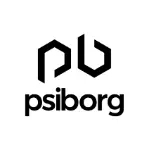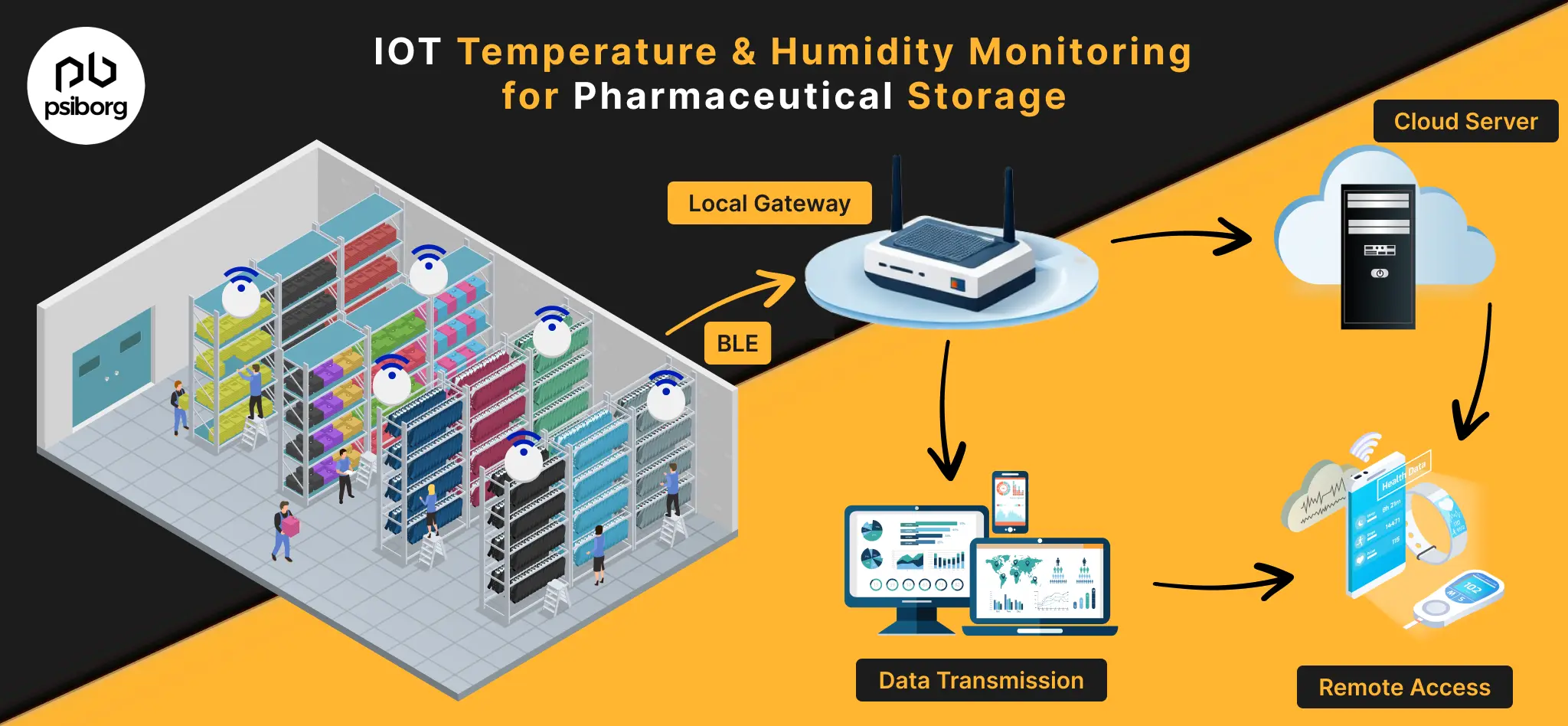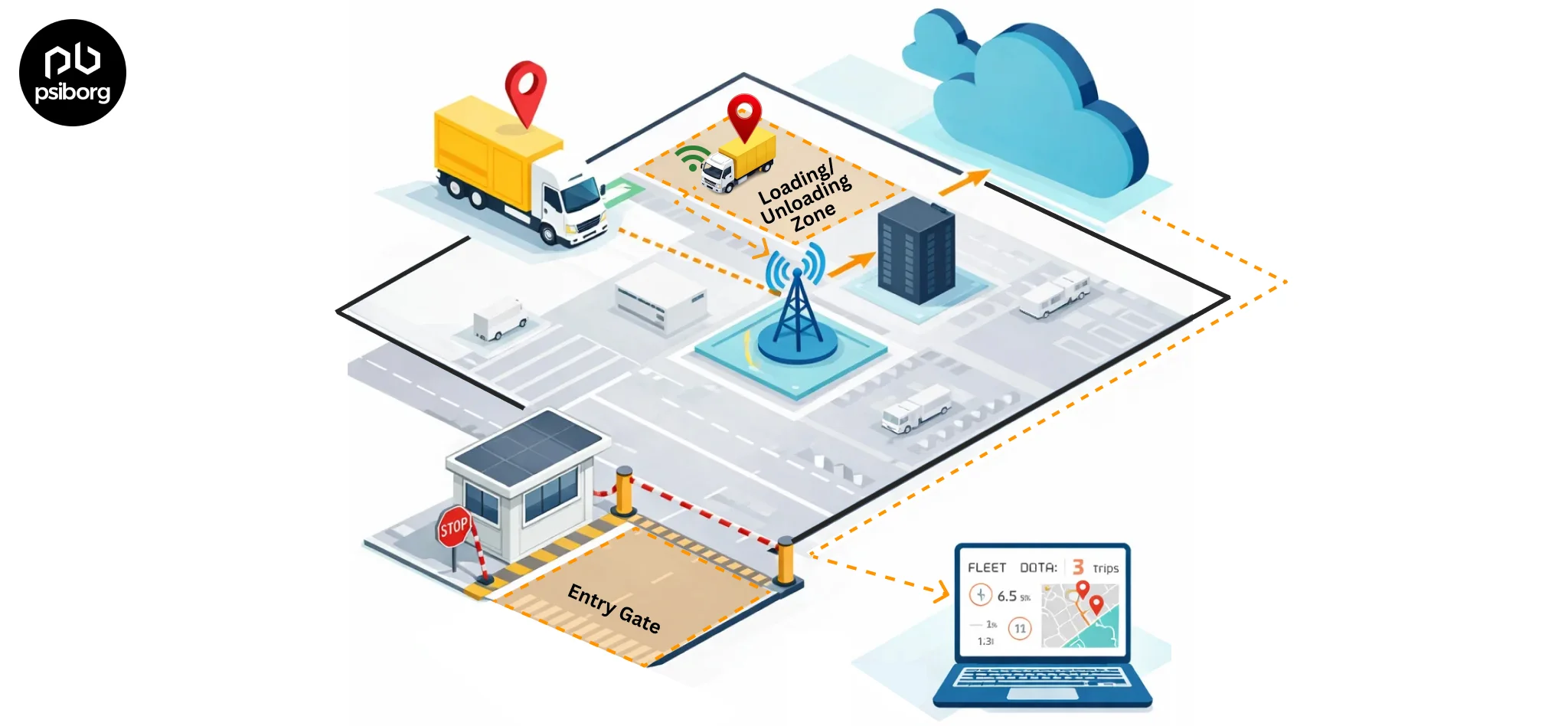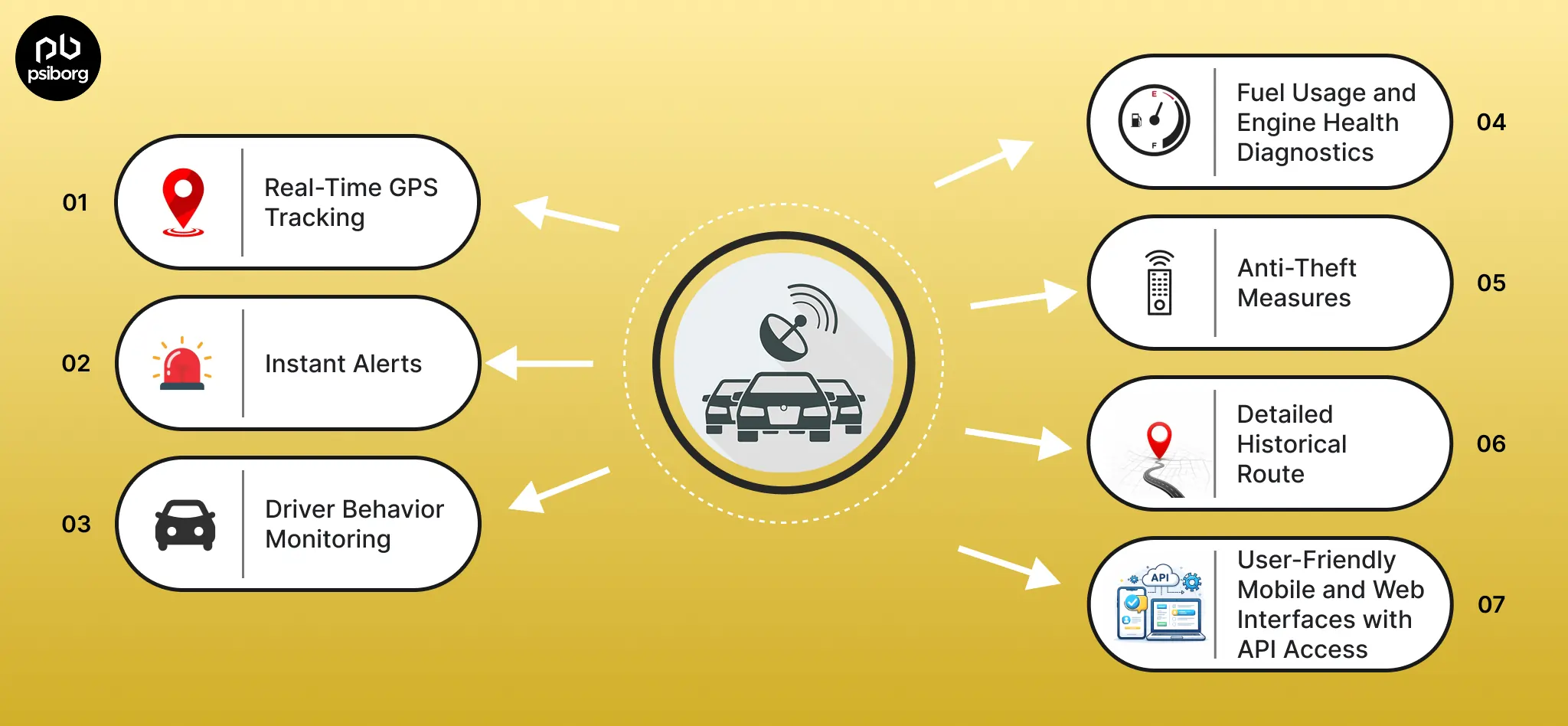Precision farming using IoT is not a high-tech system that helps you grow 10 times the amount of a crop and makes you rich.
It is a smart technology that has given rise to “precision farming,” helping farmers increase their productivity by improving and managing fertilizers and other agricultural practices to promote crop growth. It helps farmers control crop and livestock production and saves costs and resources.
Let’s look at all these use cases in detail, but first, it’s crucial to understand the term “precision farming.”
Precision Agriculture Using IoT: Explained
The IoT-based precision agriculture solution uses smart devices and sensors to improve the traditional farming system. Smart agricultural solutions can involve machines and even farm operations. Precision farming can easily be understood as a site-specific crop management and monitoring solution.
The basic role of precision agriculture using IoT is to generate large amounts of data, give real-time information based on the data, and automate tasks. All of this is done to improve productivity and increase profitability.
Types of Precision Farming Technology
Some notable precision farming technologies that are utilized by agritech businesses are:
Remote Sensing
The remote sensing technology uses sensors to collect data like soil moisture, crop health, and other factors remotely.
This remote-sensing technology helps farmers make better decisions and develop crop-specific strategies to increase agriculture yields and decrease waste.
GPS
The Global Positioning System, GPS provides instant and accurate data regarding the location and condition of the farm, all in near real-time.
This technology is very helpful in tracking the location of where the fertilizer or pesticides have been sprinkled on the farm.
Soil Sensors
The soil sensors are actively used in soil health monitoring and give farmers detailed insights on soil moisture levels, nitrogen levels, and several other parameters to promote active growth in crops.
The soil sensors can be placed all around the farm and in the regions where farmers want to keep an eye to improve soil fertility in that specific area.
Crop Sensors
The crop sensors are used to monitor several aspects of plant health, such as chlorophyll level, pest intrusion, precipitation, and temperature. By getting real-time information on these factors, farmers can monitor and pinpoint the areas of the field under stress and adjust their strategies accordingly.
Drones
Who doesn’t know about drones, these days? Drones are now so popular that they are literally used everywhere, from deliveries to clicking wedding photos. However, very little of the population is aware of the use of drones in agriculture. The drones used in agriculture are equipped with cameras, sensors, and GPS. They collect information regarding crop health, create detailed maps, and identify areas that require care.
What are the Advantages of Precision Farming?
As we said, IoT has many use cases in the agriculture industry. However, before tapping into that topic, let’s first understand how the IoT benefits precision agriculture.
Sensing and Monitoring
IoT technology uses several agricultural sensors. These sensors are considered electrotechnical devices that can measure the physical quantities of the environment and convert these measurements into a signal that can be interpreted by an instrument. So, these sensors record various agricultural parameters like temperature, humidity, CO2/O2 level, moisture content, NPK value, and more to help farmers better manage their farms.
Insightful Farming
Once you get the data about the soil, crop, livestock, and farm territory, you can work according to that data. Smart IoT solutions make you make knowledgeable decisions to increase profitability. This means farmers can make precise decisions about the amount of seed or fertilizer to be put in the soil.
Automation
In addition to the manufacturing industry, the agritech industry is another sector that can benefit greatly from automation. Until now, most agricultural work has been carried out manually. However, this can be very tiring for workers and farmers. IoT automation for various agricultural processes can make agricultural work easier.
Also Read: IoT in Manufacturing Industry
Reduced Costs
The practices of precision farming using IoT make use of strategies that can significantly minimize the overall farming cost by minimizing the use of fertilizers, pesticides, and water. With site-specific management strategies, farmers can use their resources more efficiently, ultimately reducing input costs and improving profitability.
Better Turnaround
When you get accurate and good insight into the soil and the crop, you can make better decisions. Plus, automated agriculture and smart supply chain management make precision farming easier and more profitable for the users.
Top 7 Examples of Precision Farming
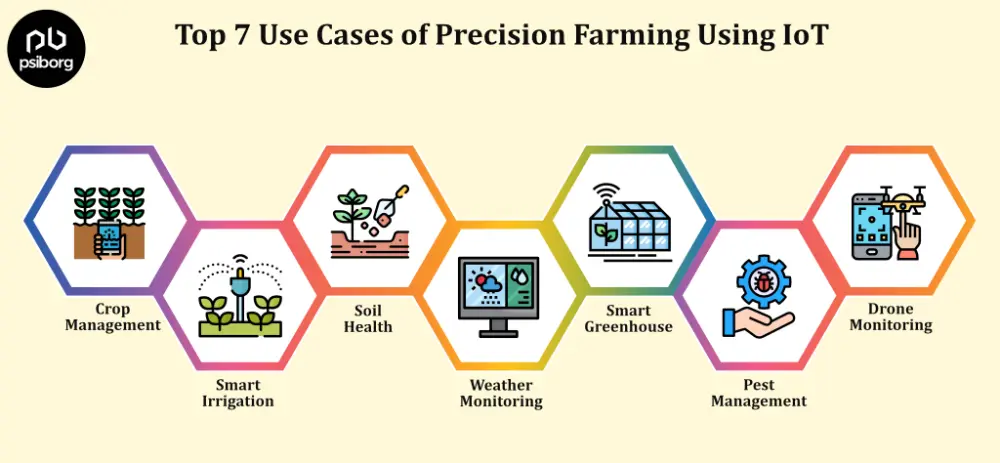
Below are examples of how you can use smart IoT-based precision agriculture to boost your farming business:
1. Crop Management
The crop management IoT devices are very popularly used for precision agriculture. The device has to be placed in a specific crop-monitoring field. They collect data like temperature, precipitation, leaf moisture potential, and general crop conditions. It is best suited to monitor crop growth and related anomalies in real-time and is very helpful in preventing diseases or pathogen infections that can harm crops.
PsiBorg’s smart agriculture solution gives you detailed information from roots to fruit.
2. Smart Irrigation
By smart irrigation system using IoT, we mean automating the entire irrigation process. So, automated sprinkler/drip systems or intelligent pumps are used in smart irrigation. Here, soil moisture sensors are also utilized to get the moisture details of the soil on the specified agricultural land. Based on the data collected from the soil moisture sensors, the intelligent pumps are turned on/off.
3. Soil health/quality monitoring
Till today, farmers use the sampling method to determine the fertility of the soil and its moisture content. However, sampling doesn’t give accurate results as chemical decomposition in soil varies from place to place, plus the process is time-consuming.
To make things correct, sensors are installed in a field uniformly across the length and breadth of the farm to collect accurate soil-related data like NPK value, porosity, and much more, which can be further viewed on the dashboard or mobile in near real-time for proper farm monitoring.
4. Weather Monitoring
The entire agricultural process is highly dependent on the weather. Plant growth can be enhanced or impaired, depending on the climatic conditions. IoT-driven precision farming, temperature, humidity, light intensity, soil moisture, and CO2 values can be monitored through sensors. The data collected by the sensors can be further used to trigger alerts and automate processes like water or air control.
5. Smart Greenhouse
As we mentioned, climatic conditions play a big role in agriculture, and when it comes to delicate crops like herbs and exotic flowers, climatic control becomes more important. For this reason, smart greenhouses are now industrialized in size and capacity to grow fruits and vegetables.
6. Insect/Pest management
The Insect/pest management IoT solutions are used to improve the growth and quality of the crop with the help of automated camera traps, spray timing tools, and custom solutions for unique pest behaviors.
7. Drone Monitoring
IoT-based drone monitoring solutions help large companies reduce monitoring costs. The drones collect data, which is analyzed on a server for decision-making.
Also Suggested: Sensors Use in Agriculture
To Sum Up,
Crop production requires critical decision-making based on the right data at the right time to achieve the best results.
At PsiBorg, we develop smart IoT solutions for precision farming to make your job easier, no matter what type of crops you work with.
Whatever your goal is, PsiBorg helps you achieve your desired outcome through IoT product development and smart IoT solutions, such as:
- Accelerating research and development
- Streamlining the food supply chain
- Supporting agronomic advice
- Maximizing yield and quality
- Reducing the use of pesticides
- Improving water and nutrient supply
- Managing tasks and logistics in agriculture
At PsiBorg, we make IoT-based precision agriculture and smart agriculture solutions to collect and measure data and transform it into insights that will help you make the best decision at the right time with convenience.
Contact us today if you have any smart agriculture-related requirements.
Meanwhile, Happy Reading!
FAQ
Precision farming is used to reduce input costs by making farmers use data-driven insights more effectively. Moreover, the major objectives of precision farming are to improve resource usage, maximize crop yield, increase profit, and reduce environmental impact.
The types of technologies that fall under precision farming are GPS, GIS, sensors, remote sensing technology, and drones,
Precision farming technology utilizes the power of IoT (Internet of Things) rather than AI, allowing the collection of real-time, precise data across the entire farm and crop. Through the deployment of IoT devices and sensors, this technology delivers accurate data in real time, eliminating the need for predictive data reliance.
One example of precision farming is the use of soil moisture sensors and GPS-guided equipment to precisely manage irrigation and planting, thus improving crop yield and resource efficiency.
